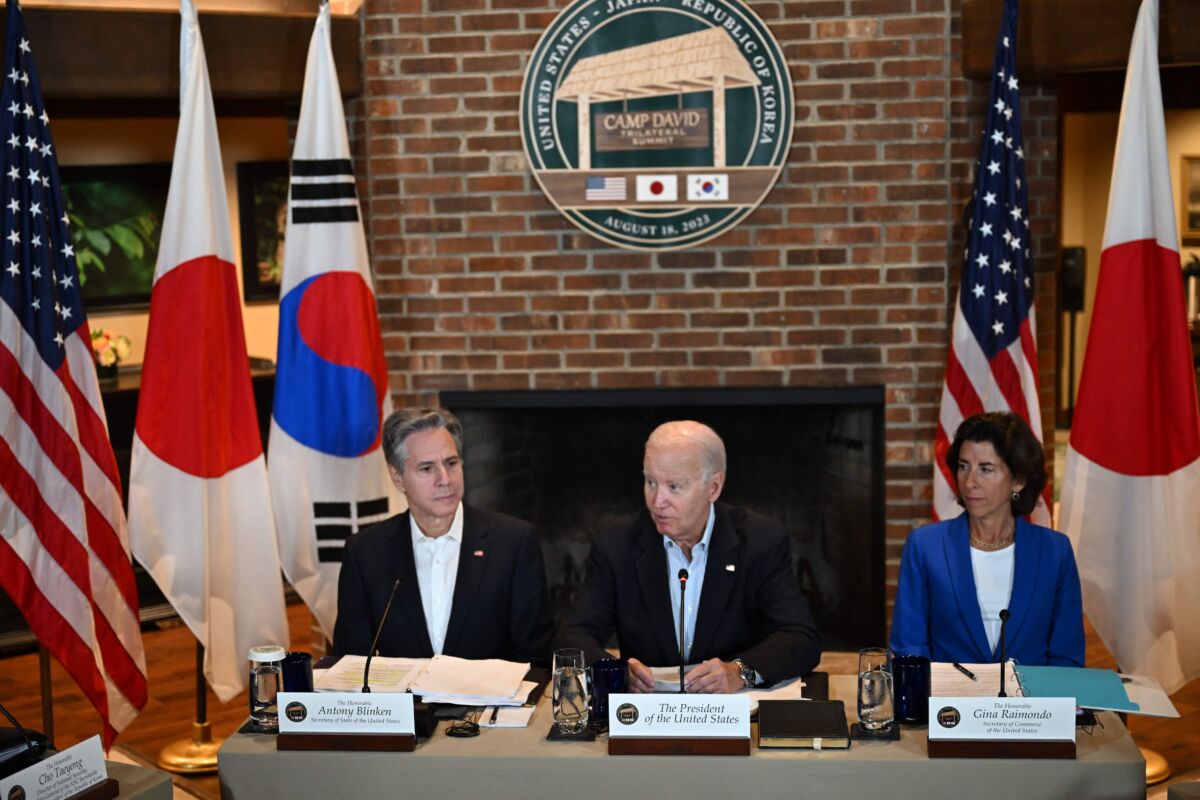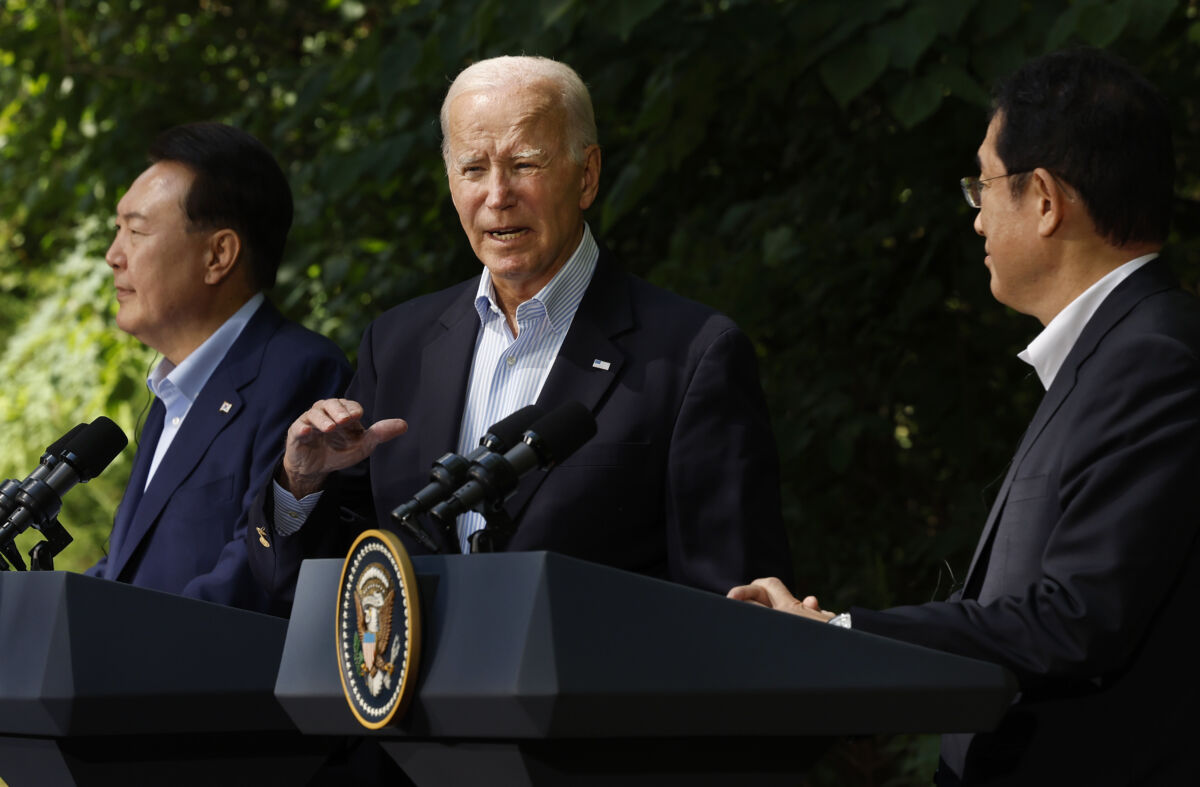CAMP DAVID, Md.—President Joe Biden and the leaders of South Korea and Japan agreed to deepen trilateral security and economic ties at a historic summit at Camp David on Aug. 18. They also issued a strong condemnation of the Chinese regime’s “dangerous and aggressive behavior” in the South China Sea.
President Biden announced the agreements, including what the leaders termed the “Camp David Principles,” at the close of his talks with South Korean President Yoon Suk Yeol and Japanese Prime Minister Fumio Kishida.
“The purpose of our trilateral security cooperation is and will remain to promote and enhance peace and stability throughout the region,” they said in a joint statement.
President Biden maintained, as have U.S., South Korean, and Japanese officials, that the summit “was not about China” but was focused on broader security issues.
In a joint summit statement, the three countries committed to consult promptly with each other during crises and to coordinate responses to regional challenges, provocations, and threats affecting common interests.
They also agreed to hold trilateral military training exercises annually and to share real-time information on North Korean missile launches by the end of 2023. The countries promised to hold trilateral summits annually.
The three leaders also agreed to cooperate on “supply chain resilience,” particularly on semiconductors and batteries, as well as other advanced technology such as artificial intelligence and quantum computing.
Partnership Takes Aim at China, North Korea
The three powers specifically called out communist China and North Korea by name, and vowed opposition by the three powers against any unilateral changes to the current status quo in the Indo-Pacific.
“Regarding the dangerous and aggressive behavior supporting unlawful maritime claims that we have recently witnessed by the People’s Republic of China (PRC) in the South China Sea, we strongly oppose any unilateral attempts to change the status quo in the waters of the Indo-Pacific,” the statement said.
“In particular, we steadfastly oppose the militarization of reclaimed features; the dangerous use of coast guard and maritime militia vessels; and coercive activities,” it added.
“We reaffirm the importance of peace and stability across the Taiwan Strait as an indispensable element of security and prosperity in the international community. There is no change in our basic positions on Taiwan, and we call for a peaceful resolution of cross-Strait issues.”
To that end, the South Korean president said that solidarity between the three powers was necessary to ensure that the freedom of all was not impinged upon.
“President Roosevelt once stated: Freedom is not a given, but something you fight to win,” Mr. Yoon said. “To make sure that each of our freedoms is neither threatened or damaged, our three nations must tighten our solidarity. Such is also our promise and mandate towards our future generations.”

Commitment to Consult
Among the principles adopted on Friday is also a “commitment to consult,” in which the trilateral partnership agreed to consult with each other and to coordinate responses to “regional challenges, provocations, and threats affecting our collective interests and security.”
Such consultation, it is expected, will include the sharing of intelligence, aligning of messaging, and coordination of responsive actions to emerging threats.
Standing alongside Mr. Kishida and Mr. Yoon, President Biden praised the leaders for their political courage in pursuing a rapprochement. He said they understood the world was “at an inflection point, where we’re called to lead in new ways, to work together, to stand together.”
“Critically, we’ve all committed to swiftly consult with each other in response to threats to any one of our countries from whatever source it occurs,” he said. “That means we’ll have a hotline to share information and coordinate our responses whenever there is a crisis in the region, or affecting any one of our countries.”
“Together we’re going to stand up for international law,” and against “coercion,” President Biden said.
Without mentioning China by name, Mr. Kishisa said, “Unilateral attempts to change the status quo by force in the East and South China Seas are continuing,” while adding that the North Korean nuclear and missile threat was “only becoming ever larger.”

‘Unprecedented Meeting’
China’s communist regime has lashed out against the warming ties between the three powers, accusing the partners of “increasing tensions,” and vowed “opposition” to any moves that it considers counter to its own interests.
State Department deputy spokesperson Vedant Patel said earlier this week that the trilateral summit is not a “provocative” act.
“There is no reason to view this summit as provocative or any kind of step or effort to incite tensions,” Mr. Patel said at an Aug. 15 press briefing.
“What this is about is deepening our partnership and collaboration on a number of areas that we believe are in the mutual shared interest of our three countries.”
The United States maintains robust alliances with both Japan and South Korea. Only recently, however, has the possibility of defensive cooperation between Tokyo and Seoul begun to emerge.
Historic tensions dating to Japan’s occupation of Korea in the first half of the 20th Century previously prevented much deep cooperation between the two nations. But in recent years, the growing aggressiveness of communist China and North Korea has served to thaw those tensions and push the two powers toward a more cooperative posture.
Denis Wilder, senior fellow for the Initiative for U.S.-China Dialogue on Global Issues at Georgetown University, said that the move was thanks to the unprecedented work of South Korean and Japanese leadership.
“This is an unprecedented meeting,” Wilder said during an Aug. 18 interview with NTD, the sister media outlet of The Epoch Times. “The three leaders have never met like this. Usually, the meetings have been on the sidelines of other meetings.”
“But the South Korean president, in particular, has done a lot this year to smooth the relationship with Japan.”
To that end, White House National Security Adviser Jake Sullivan said the leaders were taking bold action to cement that warming relationship and build out institutional frameworks for more robust, trilateral security cooperation between the three powers. He emphasized, though, that the partnership was “explicitly not a NATO for the Pacific.”
“We’re opening a new era, and we’re making sure that era has staying power,” Mr. Sullivan said during a press briefing earlier in the morning.
The partnership, Mr. Sullivan said, would promote a positive vision for the future of the Indo-Pacific, and work to ensure a more just and stable region.
“This partnership is not against anyone; it is for something,” Mr. Sullivan said. “It is for a vision of the Indo-Pacific that is free, open, secure, and prosperous.”
Asked whether the trilateral partnership would turn the tide against communist China’s growing aggression in the region, Mr. Wilder remained optimistic, adding that the United States’ efforts went well beyond these two alliances.
“This helps, but the United States is also bolstering allies and partners throughout the region,” Mr. Wilder said.
“We are bolstering our defenses in the face of a growing Chinese military threat.”
Emel Akan, Reuters, and The Associated Press contributed to this report.
From The Epoch Times
